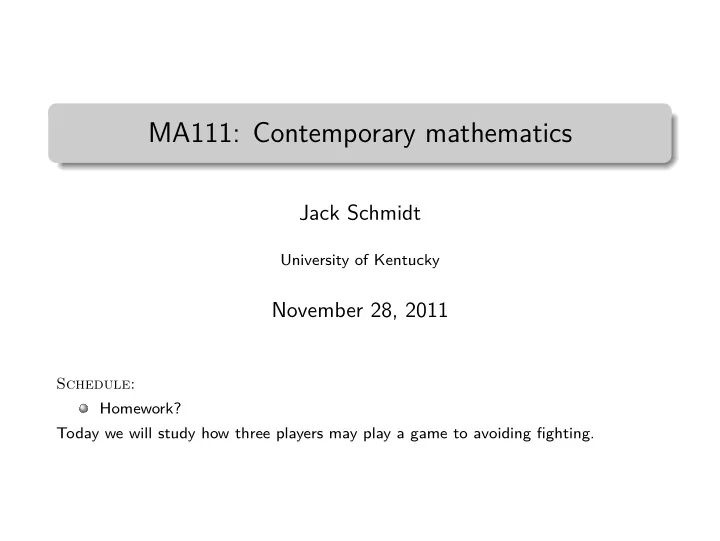
MA111: Contemporary mathematics Jack Schmidt University of Kentucky - PowerPoint PPT Presentation
. . MA111: Contemporary mathematics Jack Schmidt University of Kentucky November 28, 2011 Schedule: Homework? Today we will study how three players may play a game to avoiding fighting. The loot in the eye of the beholders $24 We saw last
. . MA111: Contemporary mathematics Jack Schmidt University of Kentucky November 28, 2011 Schedule: Homework? Today we will study how three players may play a game to avoiding fighting.
The loot in the eye of the beholders $24 We saw last time that the way the cake is cut can cause suffering Carl . $18 . $18 . Bart . . We have a single cake, half-strawberry, half-chocolate, $12 . Alex . $12 . $24 . . but three people who own 1/3rd of it value it differently: or it can make it so that everyone is happier than expected!
A game to cut the cake We saw that maximal total happiness didn’t make everyone happy We saw that a mind-reading (email-reading) all-powerful altruistic government could make everyone happy Can the people find happiness themselves? We need a game to cut the cake! “Lone divider” is one such game
The rules of Steinhaus’s game yes-section) together, and divides them again No step 4: Player 2 and player 3 each get one section they said yes Player 2 gets the rest Player 3 gets the section they chose in 4.2, and Step 4: Player 1 gets the left-over section not combined in 4.1, Outcome: 4.2 The 3rd player says “yes” to one of them 4.1 The 2nd player pushes two of the sections (including the Requirements: three players, a divisible resource 4. If both players said “yes” for one section (the same section), actually they secretly commit to “yes” or “no” without telling the other 3. 2nd and 3rd player say “yes” or “no” for each section 2. 1st player divides the resource into three sections 1. Randomly assign “1st”, “2nd”, and “3rd” to the players Rules: to, Player 1 gets the rest
Strategy for player 1: One good piece for me . . $4.5 . $4.5 . $27 . Bart . $6 . $3 $27 Suppose Alex is player 1, and divides the cake like this: . Alex . $3 . $6 . $27 . . What do you think Bart and Carl will do? . Carl
Strategy for player 1: One good piece for me . . $4.5 . $4.5 . $27 . Bart . $6 . $3 $27 Suppose Alex is player 1, and divides the cake like this: . Alex . $3 . $6 . $27 . . What do you think Bart and Carl will do? . Carl
$8.25 . One good piece for me: how does it go? $3 . $27.75 . $6 . Alex . $16.5 . . Carl’s strategy seems clear: Choose the good piece $16.5 . Bart . $19.13 . $4.5 . $12.37 . . Carl So Bart gets to recombine two of the pieces. . Let’s assume he uses the winning strategy: . . $27.75 . $6 . Alex . $16.5 . $3 . $16.5 . Bart . $19.13 . $4.5 . $12.37 Carl $8.25 .
One good piece for me: how does it go? $3 . . $27.75 . $6 . Alex . $16.5 . . So Bart gets to recombine two of the pieces. $16.5 . Bart . $19.13 . $4.5 . $12.37 . Carl’s strategy seems clear: Choose the good piece Carl . $12.37 Let’s assume he uses the winning strategy: . . $27.75 . $6 . Alex . $16.5 . $3 . $16.5 . Bart . $19.13 . $4.5 . Carl $8.25 . $8.25 .
Good piece for me: final results What did Alex do wrong? He made a section he didn’t want (and then got it!) Alex: $6 of cake for $12 paid, � Bart: $16.50 of cake for $12 paid, � Carl: $19.13 of cake for $12 paid, � Total: $41.63 of cake for $36 paid, � ?
Winning strategy for Player 1: Honesty $6 . . $16.5 . $12 . Alex . $15 . . Carl $15 . Bart . $15.75 . $9 . $11.25 . Bart and Carl both only want the Chocolate half, so Bart divides it: . How should Alex avoid getting a piece he doesn’t want? $6 He should divide the cake fairly! . . $12 . $12 . $12 . Alex . . $18 $6 . $24 . Bart . $9 . $9 . Carl $7.5 .
Winning strategy: Results . Carl . $11.25 . $9 . $15.75 . Bart . Alex gets the unclaimed, Carl chooses, then Bart gets the rest $15 $6 . $15 . Alex . $12 . $16.5 . . $7.5 . Alex: $12 for $12, � Bart: $15 for $12, � Carl: $15.75 for $12, � Total: $42.75 for $36, �
Who goes first? Alex only got $12 for $12, while the other two did better. 1st player’s winning strategy always results in an exactly fair share. 2nd player’s winning strategy does a little better, but 3rd player always gets his favorite share We have to randomize the order to keep it fair
Harder questions Does the winning strategy always win? What if Bart and Carl are sociopaths, or at least HATE Alex. Can Alex still guarantee he gets 1/3? Does the 1st player have a better strategy? he already has a winning strategy, so he doesn’t need better, but maybe he is greedy Can we make the game give equitable shares, so each player gets a piece of the “extra”? What happens with 4 players?
Recommend
More recommend
Explore More Topics
Stay informed with curated content and fresh updates.
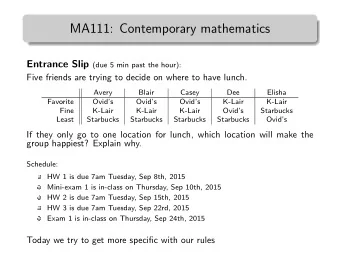















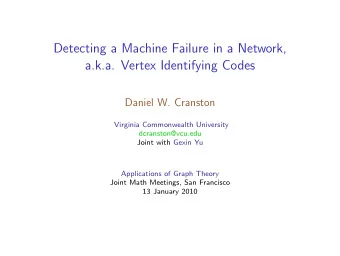
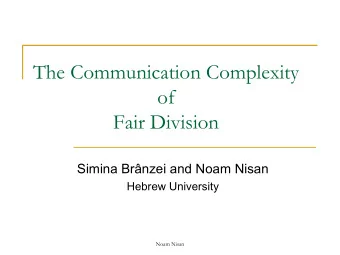

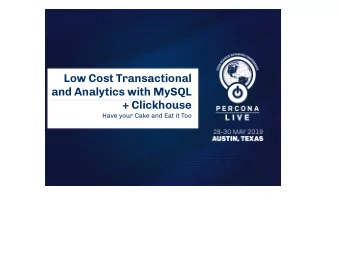

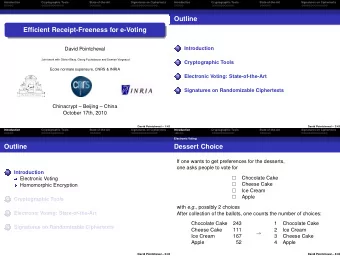
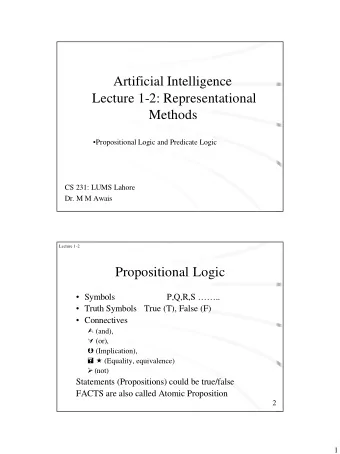
![CSC2556 Lecture 6 Kidney Exchange Cake-Cutting [Some illustrations due to: Ariel Procaccia]](https://c.sambuz.com/812559/csc2556-lecture-6-s.webp)